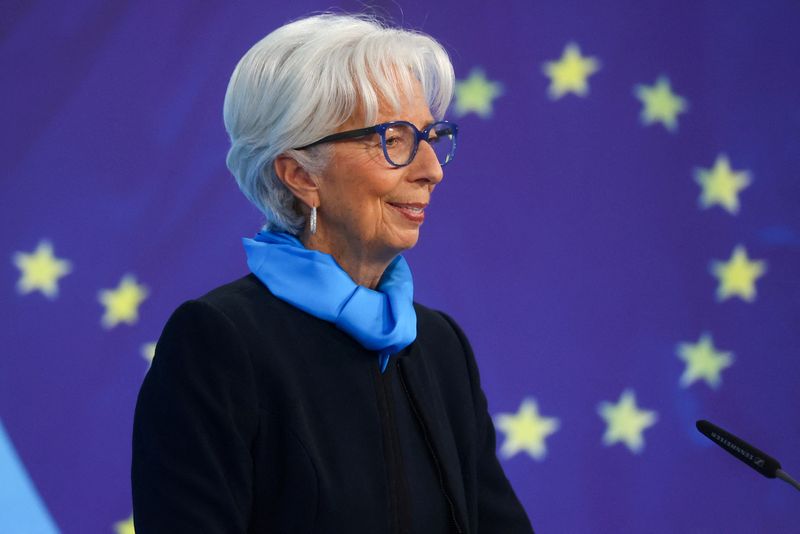FRANKFURT, Dec 16 (Reuters) – The European Central Bank cut support for the euro zone economy by another notch on Thursday but promised copious support for 2022, confirming its relaxed view on inflation and indicating that any exit from years of ultra-easy policy will be slow.
Following are highlights of ECB President Christine Lagarde’s comments at a news conference after the policy meeting.
INFLATION HARD ON CONSUMERS
“Inflation is very hard on consumers… There is a trail between energy prices … and retail prices and we have to respond and we are responding.”
PRICE IMPACT OF ENERGY DEMAND
“Energy is more than two-thirds of this very significant difference between our September projections and our December projections. The other part of it is essentially related to the longer duration of the supply bottlenecks.”
ENERGY DEMAND UNEXPECTEDLY STRONG
“Energy prices is not something that you can anticipate, diagnose. It comes as a result of a lot of geopolitical issues. It comes as a result of a very significant demand that very few people had expected to be at that level. It comes from some climate-related issues as well.”
NOT AT INFLATION TARGET
“In relation to our inflation projection for 2023 and 2024, which are at 1.8%, respectively, a small 1.8% and a slightly higher 1.8% for 2024, we are really making progress towards target.
“Are we at target? Given that our target is 2% over the medium term and looking at the three criteria of our forward guidance, not quite.”
POSSIBLE INFLATION RISK
“Is there an upside (inflation) risk? There is possibly an upside risk, but I think that staff in putting their projections together, having (in) particular anticipated some impact on wages, we are as you know looking very, very carefully into wages, into negotiations to determine how much of a second round effect there would be on inflation.”
WAGE PRESSURE WEAK
“On the wage account and how much of a second-round effect it would have, as I said, we are extremely attentive to what happens on a weekly basis. But what we are seeing now certainly is significantly below the levels that have been factored into the projections that we have.”
2022 RATE HIKE UNLIKELY
“We are driven by data and we will be reviewing next March, next June, next September. As we receive updated projections, we will reassess… we will adjust in either direction depending on the data that we receive.
“But suffice at this point to indicate that under the present circumstances, as I have said before, it is very unlikely that we will raise interest rates in the year 2022. That still stands.
“But we have to be very attentive to what data tells us. And we will do so at each and every monetary policy meeting.”
ON SUPPORT FOR THURSDAY’S MEASURES
“There were a few members who did not agree with one or the other elements of the package and therefore did not support it all. But I can tell you that it was a very, very broad majority that supported the whole package.”
BALANCED RISKS
“We see the risks to the economic outlook as broadly balanced. Economic activity could outperform our expectations if consumers become more confident and save less than expected. By contrast, the recent worsening of the pandemic, including the spread of new variants, could be a more persistent drag on growth.”
INFLATION OUTLOOK
“The future path of energy prices and the pace at which supply bottlenecks are resolved are risks to the recovery and to the outlook for inflation. If price pressures feed through into higher-than-anticipated wage rises or the economy returns more quickly to full capacity, inflation could turn out to be higher.”
ENERGY PRICES
“The upswing in inflation primarily reflects a sharp rise in prices for fuel, gas, and electricity.”
ELEVATED INFLATION
“(Inflation) will remain above 2% for most of 2022. Inflation is expected to remain elevated in the near term, but we expect it to decline in the course of next year.”
BOTTLENECKS
“Shortages… are hampering production of manufactured goods, causing delays in construction and slowing down the recovery in some parts of the service sector. These bottlenecks will still be with us for some time, but they should ease during 2022.”
STRONG REBOUND
“Looking ahead, we expect growth to rebound strongly over the course of 2022.”
PANDEMIC UNCERTAINTY
“Some euro area countries have reintroduced tighter containment measures. This could delay the recovery, especially in travel, tourism, hospitality, and entertainment. The pandemic is weighing on consumer and business confidence and the spread of new virus variants is creating extra uncertainty.”
SLOWER GROWTH
“Economic activity has been moderating over the final quarter of this year and this slow growth is likely to extend into the early part of next year.”
TO TOP PRE-PANDEMIC OUTPUT
“We now expect output to exceed its pre-pandemic level in the first quarter of 2022.”
EASING INFLATION
“Inflation is expected to remain elevated in the near term but should ease in the course of next year.”
BELOW TARGET
“The inflation outlook has been revised up, but inflation is still projected to settle below our 2% target over the projection horizon.”
HEADWINDS
“Energy prices have gone up significantly, and in some industries, there are shortages of materials, equipment, and labour. These factors are restraining economic activity and are a headwind for the near-term outlook.”
LABOUR MARKET IMPROVING
“The euro area economy continues to recover and the labour market is improving, helped by ample policy support.”
PICK-UP
“Growth is moderating, but we expect activity to pick up again strongly in the course of next year.”
(Reuters Global News Desk)






















